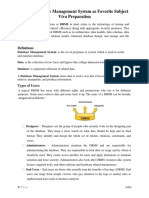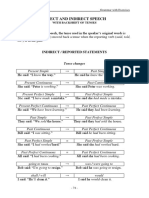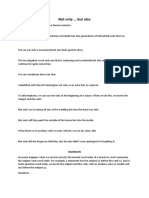0%(1)0% found this document useful (1 vote)
1K viewsUnit 5: Modals To Express Degrees of Necessity
This document discusses modals used to express degrees of necessity. It explains:
1) Modals are auxiliary verbs like can, could, may, must, etc. used to talk about obligations, advice, expectations and suggestions.
2) There are simple and perfect modals used for present/future and past respectively.
3) Must, have to, and have got to show strong necessity, with examples of their meanings and uses.
4) Other modals covered include will have to, had to, must not, had better, should/ought to, be supposed to, could/might, and don't/doesn't/didn't have to.
5) A
Uploaded by
LeAnn StokesCopyright
© Attribution Non-Commercial (BY-NC)
Available Formats
Download as PPTX, PDF, TXT or read online on Scribd
0%(1)0% found this document useful (1 vote)
1K viewsUnit 5: Modals To Express Degrees of Necessity
This document discusses modals used to express degrees of necessity. It explains:
1) Modals are auxiliary verbs like can, could, may, must, etc. used to talk about obligations, advice, expectations and suggestions.
2) There are simple and perfect modals used for present/future and past respectively.
3) Must, have to, and have got to show strong necessity, with examples of their meanings and uses.
4) Other modals covered include will have to, had to, must not, had better, should/ought to, be supposed to, could/might, and don't/doesn't/didn't have to.
5) A
Uploaded by
LeAnn StokesCopyright
© Attribution Non-Commercial (BY-NC)
Available Formats
Download as PPTX, PDF, TXT or read online on Scribd
You are on page 1/ 12
Unit 5
Modals to Express Degrees of Necessity
Modals
They are auxiliary verbs.
Can, could, had better, may might, must, ought to, shall, should, will,
and would, have to, have got to, suppose to
Modals are used to talk about obligations, advice, expectations, and
suggestions.
Simple Modals
Used for the present and future
Modal + base form
Should invite, must go, will eat
Perfect Modals
Past
Modal + have + past participle
Should have invited, must have gone, will have eaten
Must/ Have to/ Have got to
Show strong necessity
Similar in meaning
Must
Formal/show a strong obligation
All students must attend class or they will be sent back to their
home country.
Have to
Useful in all situations where there is necessity
To speak English more fluently, students have to practice.
Have got to
Informal
Tonight, I have got to do some homework.
Will have to/ Had to
Will have to
Future necessity or obligation
Next semester, I will have to take English, History,
Biology, and Art.
Had to
Past necessity
Last weekend, we all had to do a group project for class.
Must not/ Had better
Must not
Its not necessary or it is prohibited
You must not smoke within 25 feet of any EKU
entrance.
Had better
Warning that something bad or negative will happen if
the advice isn’t followed.
The students had better do their work or they will fail.
Should or ought to
Advice
They mean “It would be a good a idea if…”
Examples:
You should/ought to study for class everyday so you
will make good grades.
Use should, not ought to, in questions and negatives:
Should I invite more friends to the party? Correct
Ought I to invite more friends to the party? Incorrect
Should have/Ought to have
Express advice about past situations
Examples:
You should have/ought to have wiped your feet before
coming inside.
This suggests that the person did NOT wipe their feet.
The student should not have/ought not to have
spoken to the teacher like that.
This suggests that the student did speak like that.
Be supposed to
Show an expectation
Only in the present and the past
Present
We are supposed to wear tuxedos to their wedding.
Past
The affirmative suggests that the actions didn’t happen.
Everyone was supposed to meet at six o’clock.
The negative suggests that the action did happen.
You are not supposed to ask any personal questions.
Could/Might and Could/Might have
Polite, flexible suggestions about the future
You could/might take your girlfriend some flowers to
make her feel better.
Could/Might have
Polite suggestions about a past opportunity
Well, you could/might have visited the Washington
Monument while you were in D.C.
Don’t/doesn’t/didn’t have to
Not necessary
You don’t have to have a lot of money to be happy.
She doesn’t have to go to an expensive college to get a
good education.
Didn’t have to
Something was not necessary in the past
You didn’t have to get me a birthday gift, but thank
you.
Listening Exercise
P. 84, Exercise 6
Weekend Assignment
Come up with 5 interview questions using modals.
Example: In your country, should I dress a certain way in public?
You can use Exercise 8 on page 86 to help you come up with
questions.
Using your 5 questions, interview someone from a different
country than you. Make sure they are comfortable answering
your questions.
Write a short 3-4 paragraph essay comparing your country to
their country based off the interview.
Monday you will turn in your interview questions, their
answers, and your short essay.
You might also like
- 8th Grade Daily Language Practice (Pdfdrive)100% (6)8th Grade Daily Language Practice (Pdfdrive)114 pages
- 6th Central Pay Commission Salary Calculator100% (436)6th Central Pay Commission Salary Calculator15 pages
- Adjective Clauses, Adverb Clauses, and Noun ClausesNo ratings yetAdjective Clauses, Adverb Clauses, and Noun Clauses30 pages
- Present Perfect, Past Perfect, Future PerfectNo ratings yetPresent Perfect, Past Perfect, Future Perfect21 pages
- Simple Sentences: Dosen Pembimbing: M.Irfan, S.PD, M.M Mata Kuliah: Bahasa InggrisNo ratings yetSimple Sentences: Dosen Pembimbing: M.Irfan, S.PD, M.M Mata Kuliah: Bahasa Inggris12 pages
- Exercises in Formal and Informal English Pronunciation Exercises Phonics 39694No ratings yetExercises in Formal and Informal English Pronunciation Exercises Phonics 396943 pages
- Defining and Non-Defining Relative ClausesNo ratings yetDefining and Non-Defining Relative Clauses8 pages
- Conversation Passive Causative With Puppets - Video: StudentNo ratings yetConversation Passive Causative With Puppets - Video: Student4 pages
- Determining The Meaning of An Unfamiliar Word Through Context100% (4)Determining The Meaning of An Unfamiliar Word Through Context30 pages
- Time Period Has NOT Finished:: Present Perfect Have Seen This WeekNo ratings yetTime Period Has NOT Finished:: Present Perfect Have Seen This Week4 pages
- Le Vel 5 Resear CH Test: Define: Audience-Tone - Pur PoseNo ratings yetLe Vel 5 Resear CH Test: Define: Audience-Tone - Pur Pose7 pages
- Grammar Presentations - Chapter 14 and Part of 15 Level 4100% (4)Grammar Presentations - Chapter 14 and Part of 15 Level 436 pages
- Q3 - Week6 - Proving Right Triangles Theorem (DAY 1-2)No ratings yetQ3 - Week6 - Proving Right Triangles Theorem (DAY 1-2)39 pages
- IBM - Generative AI - Prompt Engineering Basics- Course NotesNo ratings yetIBM - Generative AI - Prompt Engineering Basics- Course Notes35 pages
- Religion Compass Volume 1 Issue 6 2007 (Doi 10.1111/j.1749-8171.2007.00043.x) Ann Jeffers - Magic and Divination in Ancient IsraelNo ratings yetReligion Compass Volume 1 Issue 6 2007 (Doi 10.1111/j.1749-8171.2007.00043.x) Ann Jeffers - Magic and Divination in Ancient Israel15 pages
- Church's Year of Grace - Volume 1 Advent To CandlemasNo ratings yetChurch's Year of Grace - Volume 1 Advent To Candlemas510 pages
- BAdI Determination of Alert Manager ClassNo ratings yetBAdI Determination of Alert Manager Class2 pages
- Discuss The Following Operating Systems Structures of Stating Advantages and Disadvantages If AnyNo ratings yetDiscuss The Following Operating Systems Structures of Stating Advantages and Disadvantages If Any4 pages
- Foundation Course Semester I Overview of Indan SocietyNo ratings yetFoundation Course Semester I Overview of Indan Society19 pages
- Class 10th Sanskrit Model Paper 2022 Up Board Exam 2022No ratings yetClass 10th Sanskrit Model Paper 2022 Up Board Exam 20225 pages
- The Societies and The Ethical Values in Beowulf and Sir Gawain and The Green KnightNo ratings yetThe Societies and The Ethical Values in Beowulf and Sir Gawain and The Green Knight9 pages
- Essays Divine and Human - Sri Aurobindo PDFNo ratings yetEssays Divine and Human - Sri Aurobindo PDF529 pages
- Performance Analysis of Three Phase Induction Motor Under Balance & Unbalance Voltage ConditionsNo ratings yetPerformance Analysis of Three Phase Induction Motor Under Balance & Unbalance Voltage Conditions5 pages
- Adjective Clauses, Adverb Clauses, and Noun ClausesAdjective Clauses, Adverb Clauses, and Noun Clauses
- Simple Sentences: Dosen Pembimbing: M.Irfan, S.PD, M.M Mata Kuliah: Bahasa InggrisSimple Sentences: Dosen Pembimbing: M.Irfan, S.PD, M.M Mata Kuliah: Bahasa Inggris
- Exercises in Formal and Informal English Pronunciation Exercises Phonics 39694Exercises in Formal and Informal English Pronunciation Exercises Phonics 39694
- Conversation Passive Causative With Puppets - Video: StudentConversation Passive Causative With Puppets - Video: Student
- Determining The Meaning of An Unfamiliar Word Through ContextDetermining The Meaning of An Unfamiliar Word Through Context
- Time Period Has NOT Finished:: Present Perfect Have Seen This WeekTime Period Has NOT Finished:: Present Perfect Have Seen This Week
- Le Vel 5 Resear CH Test: Define: Audience-Tone - Pur PoseLe Vel 5 Resear CH Test: Define: Audience-Tone - Pur Pose
- Grammar Presentations - Chapter 14 and Part of 15 Level 4Grammar Presentations - Chapter 14 and Part of 15 Level 4
- Q3 - Week6 - Proving Right Triangles Theorem (DAY 1-2)Q3 - Week6 - Proving Right Triangles Theorem (DAY 1-2)
- IBM - Generative AI - Prompt Engineering Basics- Course NotesIBM - Generative AI - Prompt Engineering Basics- Course Notes
- Religion Compass Volume 1 Issue 6 2007 (Doi 10.1111/j.1749-8171.2007.00043.x) Ann Jeffers - Magic and Divination in Ancient IsraelReligion Compass Volume 1 Issue 6 2007 (Doi 10.1111/j.1749-8171.2007.00043.x) Ann Jeffers - Magic and Divination in Ancient Israel
- Church's Year of Grace - Volume 1 Advent To CandlemasChurch's Year of Grace - Volume 1 Advent To Candlemas
- Discuss The Following Operating Systems Structures of Stating Advantages and Disadvantages If AnyDiscuss The Following Operating Systems Structures of Stating Advantages and Disadvantages If Any
- Foundation Course Semester I Overview of Indan SocietyFoundation Course Semester I Overview of Indan Society
- Class 10th Sanskrit Model Paper 2022 Up Board Exam 2022Class 10th Sanskrit Model Paper 2022 Up Board Exam 2022
- The Societies and The Ethical Values in Beowulf and Sir Gawain and The Green KnightThe Societies and The Ethical Values in Beowulf and Sir Gawain and The Green Knight
- Performance Analysis of Three Phase Induction Motor Under Balance & Unbalance Voltage ConditionsPerformance Analysis of Three Phase Induction Motor Under Balance & Unbalance Voltage Conditions

































































































